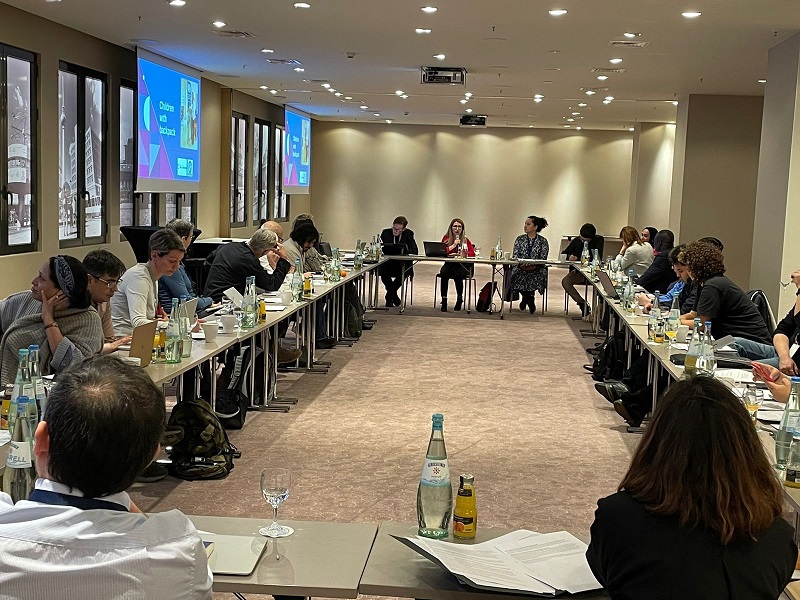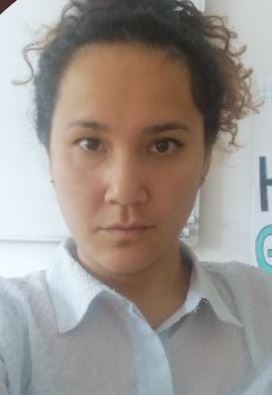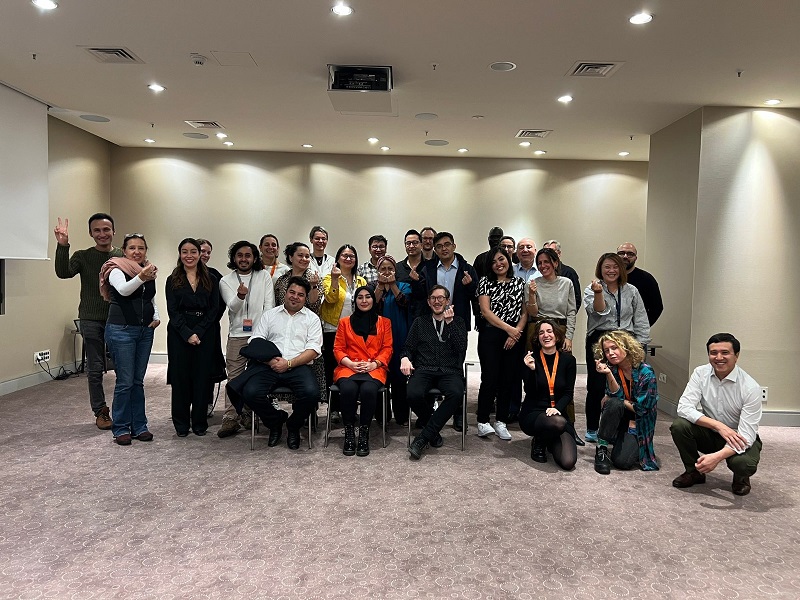International Coalition of Sites of Conscience, AHRDO and Global Initiatives for Justice, Truth & Reconciliation (GIJTR) collaborated together to hold some workshops with some advocacy-based organizations that worked with displaced people, and for the rights of different demographics of the people of Afghanistan. As a senior researcher for Bolaq Analysts Network, I took part in the online workshops along with many of my amazing colleagues that were logged on from different parts of the world: activists in asylum camps in Indonesia, advocates and researchers in Iran, Pakistan and different parts of Afghanistan. The workshops started in September 2023, with group discussions and exercises, and many online seminars about recognition of trauma and torture in forced migrants, and how to conduct essential interviews without re-harming research participants. The final session proposed sub-grants to be given out to organizations, based on certain requirements, that would then be presented in person in Berlin in February 2024. I share here my reflections on these experiences.
As these workshops invite different organizations that have different aims, not all sessions apply to all organizations. In fact, the aim is to learn as much as we can about others, about the work that they do, and realize how many people in the world are affected by forced displacement. Outside of Afghanistan, there were organizations such as that of Danish Refugee Council (Denmark) that reinforces diaspora dialogue, the National Museum of Taiwan History (Taiwan), Medico International (Germany) that work with partners also in Sri Lanka and Western Sahara, Mujer Diaspora (Spain) that provides emotional healing strategies to refugee women suffering from trauma, Global Society Initiative for Peace and Democracy (South Sudan), R-SEAT (Switzerland) that are a stakeholders advisors that aim for meaningful refugee participation at the state and international levels, The Day After (Egypt) that is part of the Victim Support group helping Syrian migrants in multiple ways including transferring legal documentations from killed male victims to their female counterparts, Rohingya Human Rights Network (Canada) that provide small-scale education and training for the Rohingyan children in camps, Oficina de Derechos Humanos del Arzobispado de Guatemala (Guatemala) that work with oral memory of victims of Guatemala and those of migrants, Info Park (Serbia) that works to provide support to the refugees transiting through the Balkan route with special focus on unaccompanied minors.
The common themes seemed to be that of trauma among forced migrants, among the persecuted communities displaced due to violence, and the trauma these migrants go through en route to their designated final destinations. As members of organizations that have the ability to see the humans behind the labels of ‘victim’ and ‘refugee’, we could listen through different accents of English and Dari/Hazaragi/Farsi, and sometimes Spanish and French. However, I found at times that even when someone spoke pure Spanish, I could still understand the pain she deals with and could understand what they want to convey without knowing their language. A Rohingyan activist spoke with Rohingyan women that were raped by armed forces, and she listens to these testimonies as a volunteer, and often through her limited English will slip into Rohingyan or Bengali, and yet, I understand it all. A Syrian activist speaks of the difficulties they have faced transferring dead men’s properties into their family’s names because properties only legally belong to men, and we all find ourselves nodding our heads. One of the guest speakers, Majid (Syria) speaks about the fragmentation of the Syrian community after the fall of Syria, even amongst the diaspora communities, and we can all acknowledge the feeling. There is a commonality that we do not want, yet have, is that we all belong to a group of people that have been persecuted and targeted on the basis of their skin color, their ethnicity, their race, gender, sexual orientation or religion. We all know how it feels to be hated, to know they want to kill us without knowing us. And it is this that we can all relate to, that brings us to this workshop and the following conference: a persecuted group.
The conference in Berlin was from February 20th to February 24th 2024. The first day there was a dinner held, an ice-breaker, where all could relax and meet each other. I purposefully find other members of organizations from Afghanistan, someone that speaks my language and can relate with. On my left, I find Zakia Shefayee from Afghanistan Women Academy (Germany) who is one of the founders of Zan Times, and on my right sits Dr. Zakira Hekmat from Afghan Refugee Solidarity Association (Turkey). I am amazed at the accomplishments and the motivations of both women, at the drive both Hazara women have. Both mothers, highly educated career women, forced migrants, have decided to help others that will go through the traumas they went through and I instantly relate. The women of Afghanistan are a force to be reckoned with. After centuries of persecution and genocide, and then the gender apartheid and persecution under the Taliban, these women have seen the worst forms of atrocities, and have chosen to believe they have the right to stand at a global stage and advocate for the rights of others that are not safe. They are well-known women within the Hazara advocacy community, but I know that for every known woman that have the privilege, like myself, to express my opinions in different languages, there are thousands of others that are unable to do so right now. This is the strength that Bolaq stands on, our researchers still on the ground that work tirelessly. Despite the fact that they have the most to lose if they get caught by the Taliban, they choose to focus on the fact that they have the most to gain if there is change to the status of the women of Afghanistan. No wonder the Taliban are afraid of these women. They are unstoppable.
The rest of the conference was full of exercises and group discussions to train our minds, in recognizing and defining further the main goals of our organizations, and exercises of capacity-building. AHRDO previewed a small clip of the work they have been conducting, spear-headed by Hadi Marifat, of victim-centered interviews, and memory boxes they are putting on their website (www.afghanistanmemoryhome.org). The clip showed an elder Hazara couple mourning and speaking of their only son’s death as a result of the bombing of Sayed al-Shuhada school in Dashte Barchi, Afghanistan. There were many in the conference hall wiping tears, and it took a little longer to leave the conference room. Everyone that had lived in Afghanistan or Quetta were instantly taken back, and the researcher in me found myself noticing people deal with their traumas differently once outside. Some cracked jokes, some walked away, some called loved ones and others hugged each other. For me, it was a refresher course, a reminder, why we are here and who we are here for.
While breakfast, two coffee breaks and lunch was provided, dinner was something we had to plan on our own. This meant networking for many organization, and a little bit of therapy for others. As we freshened up in our rooms and met at the reception area, I found a huge circle of Qawma speaking with two young Hazara men. I realized they had heard of the conference and knew there was a Hazara art exhibition and were there to invite us. I decided instantly to go, and invited along our Rogingyan activist friends. It was definitely the right choice, and an amazing chance to see Hazara hospitality. The carpet artist Amin Naadim and his wife brought us cookies and drinks, cracked jokes and spoke of their lives including their migration trajectories. The young men that had invited us, made sure they dropped us off at the hotel train station at the end of the night, something they did not have to do but felt like they wanted to do. My Bolaq Analysts Network colleague Asif Yousufi lived in Berlin, and despite having renovations at his home with his young family, invited me for food which I graciously refused. I appreciated it nonetheless. Another night, a group of Hazaras I had just met, invited me to come join them at a tea house they visited often. The final night, I was invited to an Indian restaurant by a group of (mostly) women of Afghanistan, that was an amazing experience. As a woman, I highly value being a part of this sisterhood, of ensuring I will not be left behind. As an ethnic Hazara, I see this understanding in the eyes of others, of acceptance and a sense of belonging. And as a forced migrant and advocate, there is a deeper understanding of the things we all see and read, the photos and videos we go through, that while withholding named and places due to confidentiality, we can still talk about themes to speak about the traumas that victims go though, and so do the researchers.
At the end of the last night, we spoke the whole way walking to our hotel. It felt as if all the metaphorical onion layers were peeled off, and we remained our core identities. A Pamiri women’s advocate spoke about the times she was beaten by the Taliban and showed me horrifying injuries, and spoke of how much worse Hazara women in Afghanistan are going through. She spoke of what she felt was the way out of this current siege of human rights, and then others followed with their opinions. Then we all felt despair. These between-the-conferences conversations are the conversations that are essential to be had. They will not be reports including these, nor interviews, but the human element of the transnational identities matter more than anything. There were Hazaras of Afghanistan, Hazaras of Iran and Quetta (Pakistan). In fact, there were also Hazaras of Greece, Canada and Turkey. There were stereotypes that we joked about, and then removed curtains to destroy these stereotypes. This is the Hazara advocacy of today, steps away from the advocacy of the previous generation. There is a major progress in listening, and of acceptance. Bolaq is proud to have been a part of these advocacy and documentation conferences, because the Hazaras of today have a transnational identity, and thereby, are no more limited by borders.
Finally, we are grateful to have been invited to take part in this workshop, as these international events are a privilege, and can only make our work more focused, and better. We look forward to further moments of collaborations and networking.


